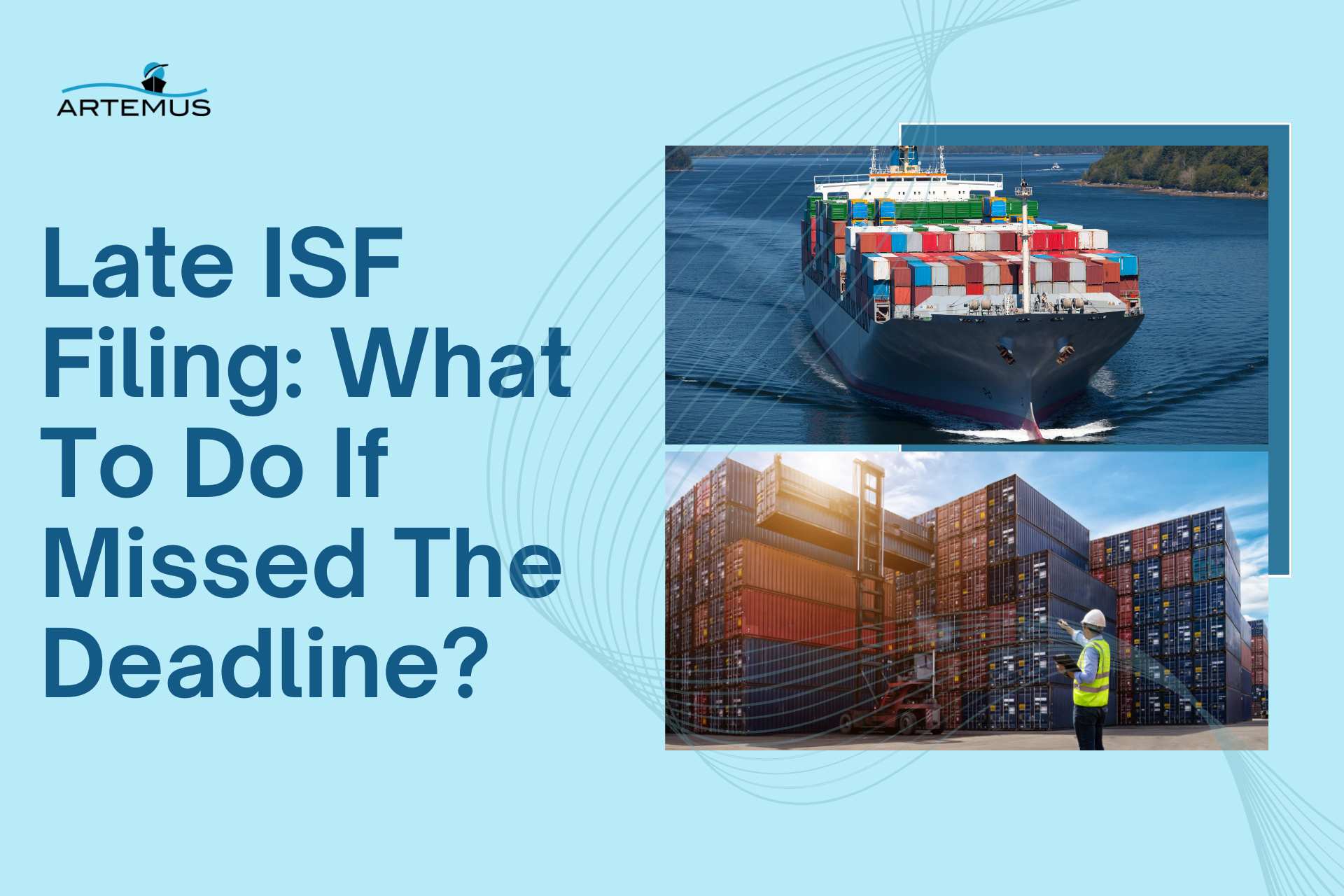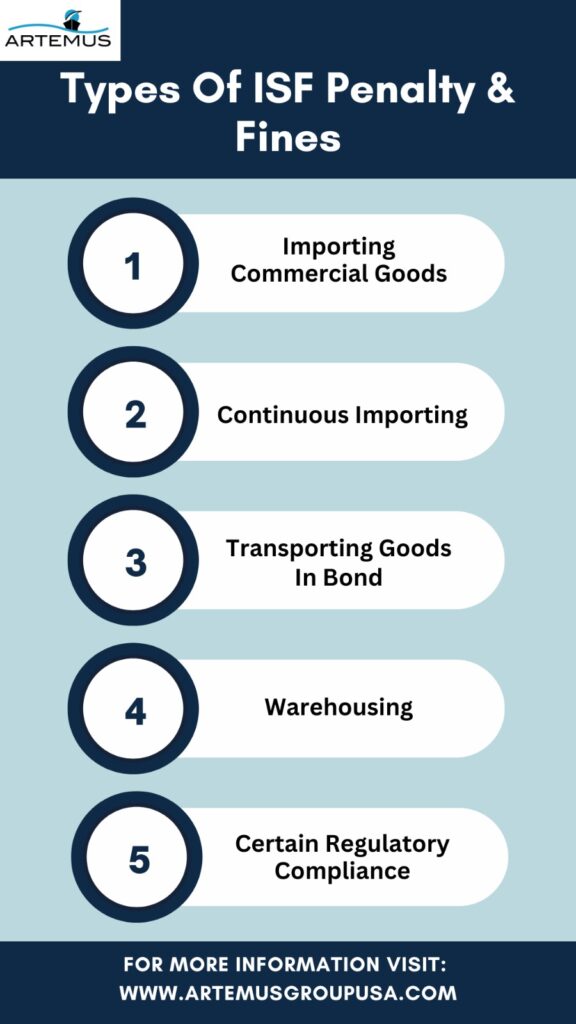
What Is Inbound Logistics & Outbound Logistics? A 2025 Guide
In the dynamic world of supply chain management, understanding the nuances of inbound and outbound logistics is crucial for operational

In the fast-paced world of international trade, staying compliant with customs regulations is a top priority for businesses. One crucial aspect of this compliance is the timely filing of the Importer Security Filing (ISF), also known as the 10+2 rule. Failure to meet ISF deadlines can result in costly penalties, delays in shipments, and even the risk of goods being denied entry into the United States.
In this blog, we’ll delve into the world of late ISF filing, discussing common reasons for delays, and potential consequences. So, let’s dive in and discover how you can effectively manage late ISF filings and keep your international trade operations running smoothly. Moreover, Artemus offers cutting-edge ISF software solutions designed to streamline the compliance process and help you stay on top of your ISF filings, even when deadlines are tight.
Table Of Contents
The ISF 24-Hour Rule, or Importer Security Filing rule, is a key element of the U.S. Customs and Border Protection’s (CBP) strategy to bolster international trade and supply chain security. It mandates that importers or their agents must provide specific cargo information to CBP at least 24 hours before cargo loads onto U.S.-bound vessels. This data encompasses cargo details, such as origin, destination, nature, and transaction parties.
The rule’s primary objective is to furnish CBP with vital information to assess security risks, facilitating informed decisions on cargo inspections and clearance. Preemptive data collection allows CBP to identify high-risk shipments more efficiently, enhance border security, and expedite low-risk cargo clearance.
Compliance is critical for importers, as failure to meet requirements may lead to penalties, shipment delays, and supply chain disruptions. Consequently, importers often turn to specialized ISF software solutions and customs experts for compliance assurance.
Related: When Does ISF Need To Be Filed? Know The Deadline
Late or non-compliance with Importer Security Filing (ISF) requirements can result in significant penalties and consequences for importers. Here are five potential consequences:

Importers who fail to file ISF in a timely and accurate manner may face monetary penalties imposed by U.S. Customs and Border Protection (CBP). These penalties can vary in amount but can be substantial, potentially costing thousands of dollars per violation.
Late ISF filings can lead to cargo holds and delays at U.S. ports of entry. CBP may withhold the release of your cargo until the required ISF information is submitted and deemed compliant. These delays can disrupt supply chains and result in additional costs.
Consistent late or inaccurate ISF filings may lead to increased scrutiny of your future shipments by CBP. This heightened attention can result in more frequent inspections and examinations of your cargo, potentially causing further delays and expenses.
Late ISF filings and associated cargo delays can harm your business reputation. Unreliable supply chains and disruptions can negatively impact relationships with customers and suppliers, potentially leading to lost business opportunities.
In extreme cases of non-compliance, CBP may pursue legal action against importers. This can involve fines, penalties, and even legal proceedings that can be financially and legally burdensome for the importer.
To avoid these consequences, importers should prioritize timely and accurate ISF filings and consider using specialized ISF software solutions to streamline the compliance process and reduce the risk of penalties and disruptions to their supply chain.
Related: ISF Filing Process: A Detailed Step-By-Step Guide
Late ISF (Importer Security Filing) submissions can lead to significant complications in the importation process. Explore the common reasons behind delayed filings to better understand how to ensure timely compliance.
Late ISF filing often occurs due to missing or incomplete cargo details. It’s imperative to collect and record this data accurately, including information about the cargo’s nature, origin, destination, and parties involved. Failing to do so can lead to submission delays, as obtaining precise data is essential for a compliant filing.
Effective communication is vital for timely ISF submissions. When parties involved, such as importers, carriers, and customs brokers, struggle to exchange necessary information promptly, it can hinder the ISF process. Efficient channels of communication need to be established to ensure smooth data sharing.
Elaborate supply chains with multiple stakeholders introduce complexities into the ISF process. Coordinating data collection and transmission among various participants can be challenging, making it crucial to have streamlined procedures and efficient data-sharing mechanisms.
International shipments often involve dealing with time zone differences. Coordinating ISF submissions across different time zones can be challenging, impacting the ability to meet filing deadlines. Proper scheduling and coordination become essential in such cases.
Outdated or inefficient technology and software solutions can significantly slow down the ISF filing process. Up-to-date and user-friendly software is crucial for collecting, organizing, and submitting the required ISF data efficiently.
Human errors, such as data entry mistakes or missing filing deadlines, are common reasons for late ISF submissions. Proper training, attention to detail, and adherence to filing schedules can help mitigate these errors.
Related: Who Is Responsible For Filing The ISF? Know The Key Roles
Timely ISF (Importer Security Filing) is paramount for smooth international trade. Discover effective strategies and best practices to prevent late filings and the associated challenges.
By implementing these strategies, you can significantly reduce the risk of late ISF filings and maintain compliance with U.S. Customs and Border Protection regulations.
Related: ISF Filing Cost: Elements, Hidden Costs, & Minimization Tips
Missing the Importer Security Filing (ISF) deadline can have serious consequences, but there are steps you can take to address the situation:
Remember that while missing the ISF deadline can result in penalties and delays, taking immediate action and working closely with CBP can help mitigate some of the negative consequences and ensure a smoother resolution of the issue.
Related: What Is ISF Bond? Types, Cost, & Components To Know
U.S. Customs and Border Protection (CBP) typically does not grant extensions for Importer Security Filing (ISF) deadlines. The ISF rule mandates that ISF information must be submitted to CBP at least 24 hours before cargo is loaded onto a vessel bound for the United States. This deadline is considered a critical element of the CBP’s security measures for international trade.
While there may be some limited exceptions or specific circumstances where extensions could be granted, such instances are rare and generally require CBP approval in advance. Importers are strongly encouraged to adhere to the ISF filing deadlines and take proactive measures to ensure timely and accurate submissions to avoid penalties and supply chain disruptions.
It’s essential to plan ahead, utilize ISF software solutions, and maintain effective communication with all relevant parties to meet the 24-hour ISF deadline.
Artemus stands out as one of the best offerers of ISF (Importer Security Filing) software solutions for ensuring seamless compliance with U.S. Customs and Border Protection (CBP) regulations. With its advanced technology and user-friendly interface, Artemus empowers importers and businesses to efficiently manage and streamline the ISF filing process.
Artemus offers a comprehensive suite of features that simplify ISF compliance, including automated data collection, validation, and submission. Its real-time monitoring capabilities enable importers to track the status of their filings and ensure timely submissions. Moreover, Artemus provides updates on regulatory changes, helping businesses stay up-to-date with evolving CBP requirements.
With Artemus, importers can minimize the risk of late filings, penalties, and supply chain disruptions, making it a top choice for those seeking a reliable and efficient ISF software solution.
Related: 5 Types Of ISF Penalty & Fines To Know To Avoid Losses
Filing an Individual Income Tax Return (ISF) late can result in penalties, interest charges, and potential delays in receiving any tax refunds owed.
In compliance with U.S. Customs and Border Protection (CBP) regulations, the Import Security Filing (ISF), also known as 10+2, must be lodged with CBP a minimum of 24 hours prior to the cargo’s embarkation onto the ship heading to the United States.
The responsibility for filing the Import Security Filing (ISF) typically falls on the importer, which can be the owner or purchaser of the goods or their authorized agent.

In conclusion, late ISF filing can lead to costly consequences, including fines and disruptions in the supply chain. Timely compliance with ISF regulations is essential for importers to avoid these pitfalls and maintain smooth international trade operations. To ensure success in this highly regulated landscape, importers should prioritize accurate and punctual ISF submissions, seeking assistance from customs experts when necessary. Remember, in the world of ISF filings, being proactive is the best strategy to protect your business and uphold the efficiency of cross-border trade.
Related: ISF Filing Online: A Beginner’s Guide To Your Import Process

In the dynamic world of supply chain management, understanding the nuances of inbound and outbound logistics is crucial for operational

In today’s interconnected world, businesses rely heavily on global trade to expand their markets, access new resources, and drive growth.

Importing goods for resale in the USA presents a lucrative business opportunity, but navigating the complexities of U.S. customs regulations,
Get In Touch
Artemus’ Software Solutions for ISF, AMS, Japan AFR, eManifest Canada, & Panama B2B filings.